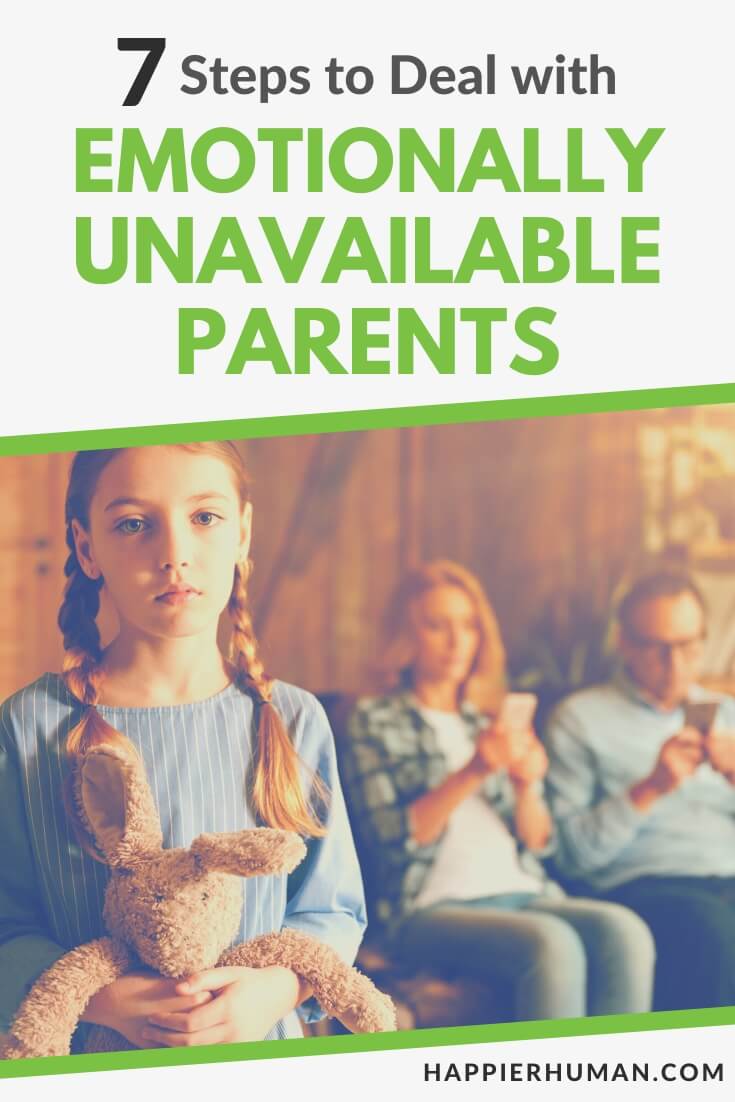My friend Sophie’s parents don’t validate her hard work, are uninterested in her achievements, and always seem to prioritize work over actually being there for Sophie and her siblings. What started in her childhood is continuing into adulthood, and she continues craving emotional support from her parents.
Sound familiar? Do your parents also avoid taking responsibility, disregard your happiness, and emotionally neglect you?
These are all classic signs of emotionally absent parents, and if you have parents like Sophie’s, you know how challenging (and damn near impossible) it is to connect with them.
You know they are your parents, but you don’t have a good (or much of any) relationship with them (and you may not want one). You feel like you aren’t enough and that they don’t love you because the basic foundations, such as love, trust, and support, of a healthy parent-child relationship are non-existent.
It’s heartbreaking that your parents can’t connect with you on an emotional level, and you probably don’t know how to handle the situation. You aren’t alone.
Here’s everything you need to know about what it means to be emotionally unavailable and how to deal with parents who aren’t there for their kids (whether child or grown up) on an emotional level.
What Does It Mean to Be Emotionally Unavailable?
Being emotionally unavailable is the opposite of being emotionally available. When someone, your parent, friend, or colleague, is available on an emotional level, they show up for you and share a healthy emotional connection (provided you are emotionally available too). Emotionally available parents are responsive and attuned to their children’s needs, and as such, they form emotional attachments with their kids.
When you grow up in a positive emotional environment where your parents are there for you emotionally, they can fully support your independence, personal growth, and learning.
With emotionally present parents, you are comforted and validated (which has a huge effect on your mental health). Plus, you learn about emotional regulation and coping mechanisms, and you can form healthier relationships with others.
Being emotionally absent is a significant barrier in a relationship, and this is even worse when it’s a parent or both of your parents who weren’t and still aren’t there for you.

Research from 2017 suggests that one of the indicators of relationship quality is how emotionally available both parties are. As such, being emotionally available is an essential ingredient for healthy and secure relationships, such as those between a parent and a child.
On the other hand, when someone is emotionally detached, disengaged, or absent, they aren’t able to connect with their feelings (whether they feel anger or happiness) or those feelings another person has.
If I compare the concept of emotional availability/unavailability to a well, then a person who has emotional depth (aka emotional availability) has a deeper well with more water, while an emotionally unavailable person has no depth and their well is shallow and pretty much empty.
For example, a parent who is emotionally unavailable struggles to open up and share, is scared of intimacy and vulnerability, and will do anything else instead of talking about how they feel.
They may have just enough emotional bandwidth to deal with their own struggles and feelings, or even that may be lacking. With limited bandwidth, there’s no space to deal with another person’s feelings and emotions so they are unresponsive when you actually expect them to have feelings and act.
The Types of Emotionally Unavailable Parents
Emotionally immature parents fall in four main groups, but there may be an overlap between these behaviors.
- The emotional parent is very impulsive and emotionally unstable. A child who interacts with an emotional parent will always feel nervous and anxious.
- The driven parent tries to bend everything to their will and standards. They imprint and project their beliefs onto their children by giving advice. It’s pretty much a case of “my way or the highway.” While these parents seem to be supportive, they live vicariously through their kids and pressure them to follow their ideas.
- The passive parent has an avoidant attachment style. They don’t like confrontation and try to avoid it at all costs. When they are present, it’s playful and loving so they can (try to) fulfill their own emotional needs. It’s all about them, and never their kids.
- The rejecting parent is condescending, intimidating, aloof, dismissive, and downright antagonistic. They’ll openly reject their children when they want affection and attention, and in extreme cases, this kind of emotionally neglectful parent physically abuses their kid.
Causes of Emotional Unavailability
Various factors contribute to a person being emotionally absent:
7 Steps for Dealing with Emotionally Unavailable Parents
If your parents are emotionally unavailable, follow these 7 steps to help you deal and heal:
1. Recognize the 20 Common Signs of Emotionally Unavailable Parents
Whenever something isn’t right, you first need to identify what’s wrong before you can move onto the next steps. It’s the same when your parents aren’t and haven’t ever been there for you emotionally.
When a parent is not emotionally present, there are telltale signs you can identify; however, these aren’t always clear-cut.
Emotionally absent parents:
- Are uncomfortable when they share how they feel, usually because they are scared of conflict and/or intimacy. They struggle to identify and vocalize how they feel.
- Ignore or minimize how you feel (and how they feel).
- Become dismissive and hostile when you share your feelings.
- Feel overwhelmed when you raise how you feel.
- Become indifferent or impatient when you have emotional needs.
- May be defensive when conflict arises or when they feel like they have to talk about their emotions and feelings.
- Are inconsistent in how they communicate. They may act vague and go MIA and then suddenly be present again with no explanation (#Houdini).
- Are insecure and may self-sabotage relationships to avoid connection and closeness.
- Can’t mirror or reflect your emotional state.
- Act or are disinterested in your life. They never ask about your work, school, studies, friends, family, achievements, or opportunities to learn (aka mistakes or failures to those who don’t have a growth mindset).
- May be open to “positive emotions” like happiness but avoid or prevent talking about “negative emotions” such as fear and anger.
- May easily express their own “negative emotions” like feeling frustrated, annoyed, or bored when they interact and engage with you.
- Can’t or won’t comfort you.
- Only offer the most basic level of care.
- Don’t make eye contact with you.
- Don’t spend time with you, and when they do, it’s a chore.
- Rarely smile at you or hug you.
- Don’t encourage you or offer positive or constructive feedback.
- Reject any displays of affection.
- Are highly critical of you, especially when you make a mistake (#IToldYouSo).
2. Take an Online Test
Unfortunately, being emotionally unavailable isn’t a simple case of “you are” or “you aren’t” present in an emotional sense. Instead, it exists on a spectrum.
With more than two decades of research on emotional availability, Dr Zeynep Biringen, developed an assessment model (called the Emotional Availability Scales) and the Emotional Availability Clinical Screener.

There are, however, easier ways for you to determine whether your parents are emotionally absent or whether you are a victim of emotional neglect, which is one form of abuse.
Here are a few online tests:
- PsychCentral has a “Was I emotionally neglected as a child” test. The quiz is an adaptation of a 2014 journal article, titled “Development and Psychometric Evaluation of Child Neglect Questionnaire.” Your answers reflect how you felt as a child in a negative emotional environment.
- PsychMechanics also has a “childhood emotional neglect test.” This online quiz comprises 18 questions, and you answer it based on a five-point scale that ranges from “Strongly agree” to “Strongly disagree.” For this test, your answers reflect how you feel now and not how you remember feeling as a child in an emotionally unavailable home.
- The test from IDRlabs.com is based on Dr John Philip Louis and his colleagues' work. This interactive “Negative Parenting Test” has 30 questions and your answers are on a scale of “Agree” to “Disagree.”
Be mindful that these “emotional neglect” tests are not diagnostic tools as your answers are based on your perceptions and memory, which isn’t objective. However, you will have a good idea of whether your folks were emotionally unavailable.
3. Do a Mental Health Check In
Living in an environment where you never feel connected (though not for a lack of trying) with your parents leaves a big dent on your mental and emotional health. In simple terms, it’s exhausting and draining to have emotionally unavailable parents, especially when you are emotionally present (or try to be).
It’s not surprising that you feel like your parents rejected you and that you weren’t (and still aren’t) important, enough, or loved. You may suffer from depression, anxiety, or various other mental health issues.
It’s time to focus on yourself now, so do a mental health check in. How are you doing (really)?
A mental health check helps you understand yourself and those around you (aka your folks) much better. With knowledge comes reduced frustration and an ability to better manage your emotions.
By understanding why your parents aren’t (and weren’t) available emotionally, you develop compassion and empathy. This doesn’t right the wrongs, but there’s a measure of comfort that comes with understanding, and from there, you are better able to forge your path ahead.
Know that you should just love and accept them as they are since they won’t change. But you are enough, you have always been enough, and you will always be enough. Learn coping mechanisms and focus on self-care.
4. Engage Your Inner Child
Another way you can “deal and heal” from emotionally disinterested parents is to engage your inner child. When you do inner child work, you recognize that you suffered childhood trauma (because your parents weren’t there for you emotionally) and you work to heal the wounded child in you.
You need to give yourself permission to feel your emotions, express how you feel, and possibly change how you see yourself and your parents.
When you engage your inner child, you repair the wounds inflicted by your emotionally unavailable parents by now giving yourself what you needed then.
Choose art therapy and play to focus on your inner child, and to help them (aka you) feel validated.
Other options for inner child work are:
5. Learn to Soothe and Parent Yourself
Part of working on your inner child and healing from the trauma is also learning to soothe and parent yourself. Your parents weren’t there for you emotionally, didn't comfort you, nor did they teach you how to comfort yourself.
So learning to soothe yourself now (even though you may be an adult) will help you deal with challenging emotions.
Self-soothing techniques can include:
Aside from these methods, you should also parent (or reparent) yourself. Try these self-parenting techniques:
6. Choose to Leave
Choosing to leave your parents isn’t an easy or light decision. They are your parents and you are programmed to love them, but that doesn’t mean they are safe for your mental health or overall well-being.
Sometimes, we need to leave and love people from a distance – it isn’t selfish to want to protect yourself and do what’s best for you.

After all, your folks weren’t there for you and they are still making you feel unloved or uncared for, so you’ve gotta be there for yourself.
You have two options here:
1. Completely distance yourself from your parents.
You should emotionally unavailable parents from a dysfunctional parent-child relationship when your parents aren’t making any efforts to change, despite various conversations, if you feel like you can’t do anything more, and when you are ready to go. You don’t need permission.
2. Setting boundaries helps you draw a line in the sand, so you can protect yourself and teach people how to treat you.
One boundary with emotionally absent parents could be to limit what you share with them. Perhaps your mom rips into you when you’ve made a mistake or failed at something, so don’t share when you didn’t succeed. And even emotionally unavailable parents when you have succeeded as even this may not be good enough for mommy dearest.
7. Consider Professional Help or Counseling
You may also need to consider seeing a professional mental health practitioner to help you process your emotions. The professional will be able to give you tools to heal and cope, and you can talk to an unbiased party where what you stay confidential.
Often, what you are feeling is tangled up and confused if your emotionally unavailable parents were manipulators, and if they frequently acted in different ways. One moment they are all lovey-dovey, and the next, they don’t care whether you breathe or not.
If this is the case, you will need the help of a trained professional to disentangle your feelings and help you make sense of these conflicting signals.
Group therapy, roleplay, and neuro-linguistic reprogramming are all useful for rediscovering and healing yourself.
Final Thoughts on Emotionally Unavailable Parents
Having parents who aren’t emotionally available isn’t fair. Once you recognize the signs of emotional neglect, you can work on yourself to heal from your childhood and adult wounds so you can show up for yourself, protect yourself, and love yourself.
You can do inner child work, learn to self-soothe and parent yourself, and set boundaries. Completely distancing yourself from your emotionally unavailable parent (or both) is also an option, and you know what’s right for you.
It’s time you turn toward yourself and give yourself the kindness, love, and comfort you need and are so worthy of. Hold space for yourself—you are worthy of being loved by others, but especially by yourself.
History repeats itself, so you may find yourself in a relationship with a partner who is also emotionally absent.
Here’s our guide on the 15 signs and characteristics of an emotionally unavailable man so become aware of emotional unavailability and protect yourself from being neglected and tossed aside by embracing your own self-worth.


